Where Is Prostitution Legal in Europe and Countries Ban on Sex Work
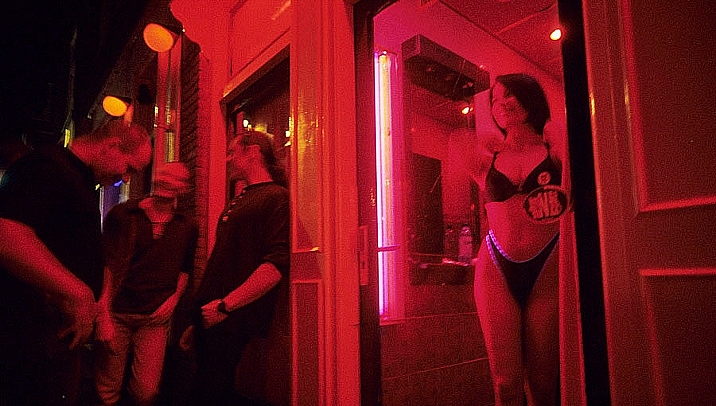 |
| Countries In Europe That Have Legalized Prostitution |
| Table Content |
Law and Policy for Prostitution in Europe
The prostitution or sex work has a long history in Europe. The management of prostitution is a very relevant and sensitive issue in the Member States of the European Union as elsewhere. Deciding which model of prostitution to adopt, amongst the possible ones is a political decision that brings with it consequences and is based on a variety of perspectives and choices (ethical, moral and religious).
At the EU Member State level, at one extreme, prostitution is considered a profession (sex-work) and is therefore legal and regulated, while, at the other extreme, it is criminalised.
The legal and social treatment of prostitution differs widely by country. Very liberal prostitution policies exist in the Netherlands and Germany, and these countries are major destinations for international sex tourism.
In Sweden, Norway, and Iceland it is illegal to pay for sex, but not to be a prostitute (the client commits a crime, but not the prostitute).
In Eastern Europe, the anti-prostitution laws target the prostitutes, because in these countries prostitution is condemned from a moralconservative viewpoint.
Other countries which have restrictive prostitution policies and officially affirm an anti-prostitution stance are the UK, Ireland and France.
Among countries where prostitution is not officially and legally regulated and recognized as a job, laissez-faire and tolerant attitudes exist in Spain, Belgium and the Czech Republic.
Different models of prostitution policies
Here, a distinction is made between four different political approaches or models:
1.Ban on prostitution: The sale of sexual services is generally prohibited.
2.Prohibition of the purchase of sexual services: It is legal to offer sexual services, however the purchase thereof is a criminal offence. This model is also referred to as criminalisation of clients or the Nordic/Swedish model, because Sweden was the first country that introduced it, in 1999, and the model now also applies in Norway.
3.Prostitution is legal, but unregulated: Prostitution in itself is permitted, i.e. neither prostitutes nor clients are punished for exchanging paid sexual services. Other aspects of the issue are mainly regulated by bans covered by criminal law. In most cases these refer to third-party activities – such as brotheloperation or procuring – or to specific types of operation e.g. street prostitution. No further regulations apply to prostitution itself: i.e. prostitution, which in itself is permitted, is not subject to any other legal requirements such as mandatory registrations or authorisation requirements. This regulation often constitutes a minimum level of political consensus, or it is based on the assumption that prostitution will disappear in the long term if all the activities which accompany it are banned.
4.Prostitution is legal and regulated: In these states, prostitution is not only permitted, but it is regulated by directives and therefore actively structured by the state. Directives of this type might be found in health or commercial law and involve licensing systems for brothels, mandatory registration for prostitutes, mandatory medical examinations etc. There are two versions of this model. The purpose of the directives in some countries, e.g. Greece, is the strict regulation of prostitution, and they relate primarily to requirements for prostitutes (e.g. mandatory medical examinations). In other countries, for example, Austria, Switzerland, the Netherlands or Germany, the objective of the directives is also to protect persons working in prostitution with regulations analogous to commercial law.
What is the number of prostitutes in Europe?The number of prostitutes across the European Union's 28 members states ranges between 700,000 and as many as 1.2 million. In Germany alone, the industry is estimated to be worth $16.3 billion, according to Germany's Federal Statistics Office. |
Which European countries observe a strict ban on sex work?
Only three countries in the European Union observe a strict ban on sex work until 2022, criminalizing both the buyers and sellers, with France, Sweden and Ireland following the so-called Nordic model of neo-abolitionism which makes soliciting sex workers illegal.
The degree of enforcement of the anti-prostitution laws vary by country, by region and by city. In many places there is a big discrepancy between the laws which exist on the books and what happens in practice.
Depending on the country, various prostitution related activities may be prohibited (where a specific law forbids such activity), decriminalized (where there is no specific law either forbidding or allowing and regulating the activity), or regulated (where a specific law explicitly allows and regulates the activity if certain conditions are met). Activities which are subject to the prostitution laws include: selling and buying sexual services, soliciting in public places, running brothels, deriving financial gain from the prostitution of another, offering premises to be used for prostitution etc.
Prostitution is illegal in France
*Prostitution itself is legal in France, but organized prostitution (brothels, prostitution rings and other forms of pimping) is prohibited. Solicitation is also illegal.
Legislation in France has been recently amended. Until 2016 both prostitution and the purchase of sexual services were considered legal, and the criminal code criminalised only organised forms or the involvement of third parties.
However, some limitations existed. For instance, in the attempt of limiting street prostitution, Law n. 2003-239 (the so-called Law Sarkozy II) introduced a ban for ‘passive solicitation’ (racolage passif).
The provision introduced in the criminal code (i.e. Article 225-10-1 c.c.) punished (with two months of imprisonment and a fine of 3.750 EUR) ‘the fact, by any means, including even a passive attitude, of publicly soliciting others with a view to inciting them to sexual relations in exchange for remuneration or a promise of remuneration’.
The French approach completely changed in 2016, switching the target in the fight against prostitution from the sex workers to the clients. Indeed, in April 2016 the Parliament adopted Law in 2016 aimed ‘to strengthen the fight against the prostitution system and to support prostituted persons’. This law repealed the ‘passive solicitation’ offence, and introduced in the Criminal Code a new Articlepunishing the ‘use of prostitution’.
According to this provision ‘the act of soliciting, accepting or obtaining sexual relations from a person who practices prostitution, even on an occasional basis, for remuneration, a promise of remuneration, a performance in kind or a promise of such an advantage is punished’ 6 with a fine of 1.500 EUR (that is up to 3.750 in case of recidivism). The fine is 75.000 EUR if the sex worker is a minor or vulnerable (e.g. illness, infirmity, disability or pregnancy). Furthermore, the French Criminal code still criminalises pimping/procuring and operating a brothel.
Prostitution is illegal in Ireland
*Prostitution itself is legal in the Republic of Ireland, but the law criminalises many activities associated with it (solicitation in a public place, operating a brothel or other forms of pimping). However, female escort prostitution is widespread. Swedish-type legislation is being considered which would outlaw paying for sex, meaning that the client would commit a crime but not the prostitute.
Till recently, sex work was not criminalised in Ireland. At the same time, the ‘Criminal Law (Sexual Offences) Act, 1993’ punishes a series of related behaviours such as soliciting or importuning for purposes of prostitution (Article 7), loitering for purposes of prostitution, organisation of prostitution, living on earnings of prostitution (Article 10), keeping brothels(Article 11) and advertising brothels and prostitution.
Furthermore, Article 23 of the ‘Criminal Justice (Public Order) Act, 1994’ prohibits the advertising of brothels and prostitution. The Irish legal approach to prostitution sharply changed with the ‘Criminal Law (Sexual Offence) Act, 2017’, which introduced the criminalisation ofthe purchase of sexual services by clients. In more detail, this new legislation amended the 1993 Act introducing Article 7A, a new offence that punishes‘a person who pays, gives, offers or promises to pay or give a person (including a prostitute) money or any other form of remuneration or consideration for the purpose of engaging in sexual activity with a prostitute’.
The penalty is a fine of up to 500 EUR for a first offence, and a fine of up to 1,000 EUR for each subsequent offence.
Prostitution is illegal in Sweden
*Paying for sex is illegal (the client commits a crime but not the prostitute). The Sex Purchase Act (Sexköpslagen), which makes it illegal to pay for sex but not to be a prostitute, was adopted in 1999 and was then unique. Since then similar laws have been passed in Norway and Iceland.
The rationale underpinning the law was the view that prostitution was a form of violence against women so the crime consists in the customer paying for sex, not in the prostitute selling sexual services.
Sweden has been the first country in the world to criminalise the purchase (i.e. clients) but not the offer (i.e. prostitutes) of sexual services (Jay Olsson, 2019: 16). This legislative model (often referred to as ‘the Nordic Model’) has been then adopted by other EU (France and Ireland) and extra-EU countries (Norway, Iceland, Northern Ireland and Canada). More in detail, the ban on clients has been introduced in 1999 by the Lex Purchase Act (Sexköpslagen) and then (2005) moved into the Criminal Code, Chapter 6 (on sexual offences), Section 11.
After the latest amendment (2011, which increased the imprisonment terms from 6 months to 1 year), the current version of the provision states that ‘a person who, otherwise than as previously provided in this chapter, obtains a casual sexual relation in return for payment, shall be sentenced for purchase of sexual service to a fine or imprisonment for a maximum period of one year. The provision of the first paragraph shall also apply if the payment was promised or given by another person’. 15 Furthermore, chapter 6 of the Criminal Code punishes also pimping, procuring, living off immoral earnings and brothel-keeping.
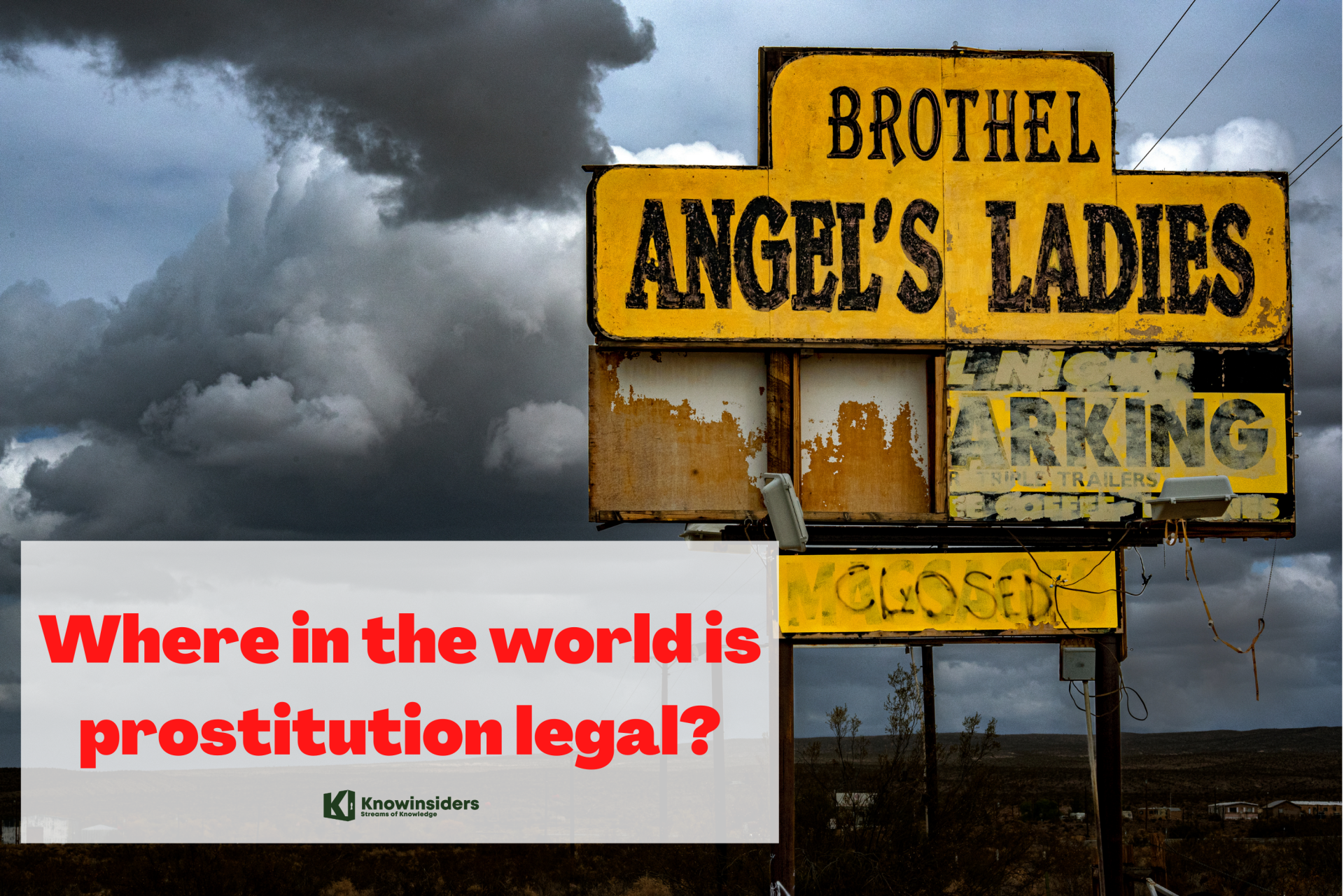 Where Is Prostitution Legal In The World? Where Is Prostitution Legal In The World? Prostitution exists and will continue to exist despite bans and their legal status, due to reasons like poverty or unforeseen situations. |
Where prostitution is legal or illegal in Europe (Full List of Countries)
Albania - Prostitution is illegal
Prostitution in Albania is illegal, but the country is a major exporter of human trafficking. Nearly all of the prostitutes in Albania come from Moldova, Ukraine, Russia, Bulgaria and are bought to Albania as it is seen as a gateway to Europe, especially Italy.
Andorra
Prostitution in Andorra is illegal.
Austria - Prostitution is legal
This is an example of regulated prostitution. Prostitution is legal but restricted by several regulations. Most prostitutes are migrants, mainly from the former Eastern Bloc countries.
Belarus - Prostitution is illegal
Prostitution is illegal in Belarus. However prostitution is present in the country, particularly in regions outside the main cities and in hotels.
Belgium - Prostitution is legal
 |
| Eastern European prostitutes |
Prostitution itself is legal in Belgium, but the law prohibits operating brothels and other forms of pimping or assisting immigration for the purpose of prostitution. However, in practice enforcement can be lax and "unofficial" brothels are tolerated (for example in Antwerp). Human trafficking or exploiting individuals for financial gain is punishable for a maximum prison sentence of 15 years. A recent report by RiskMonitor foundation found that 70% of the prostitutes who work in Belgium are from Bulgaria. Many sex workers organisations feel that the present grey area in which prostitution operates leaves sex workers vulnerable to exploitation.
Most of countries in Europe others allow prostitution itself but not most forms of procuring (such as operating brothels, facilitating the prostitution of another, deriving financial gain from the prostitution of another, soliciting/loitering).
In eight European countries (Netherlands, Germany, Austria, Switzerland, Greece, Turkey, Hungary and Latvia) prostitution is legal and regulated.
Bosnia and Herzegovina
Prostitution is illegal. The law treats procuring as a major crime. Under the law, trafficking is a state-level crime that carries a sentence of up to 10 years in prison.
Bulgaria - Prostitution is legal
Prostitution itself is legal, but organized prostitution (brothels, prostitution rings or other forms of procuring) is prohibited. Because of poor socioeconomic conditions, a high number of Romani women were involved in prostitution.
It originally gained a reputation as a transit for human trafficking, and now it has gained a reputation for being a destination for the sex trade to take place.
The Bulgarian government is stepping up its efforts to eradicate human trafficking.[1] The sex trade is a major money maker for Bulgarian criminals.
The Bulgarian government did consider fully legalizing and regulating prostitution.
Croatia - Prostitution is illegal
Prostitution in Croatia is illegal, but like in many other Southeast European countries, the problem of human trafficking for the purposes of sex is big in Croatia. However, according the U.S. State Department, Croatia is a tier 1 country, actively working to prevent the sex trade.
Czech Republic - Prostitution is legal
In the Czech Republic, prostitution is legal, but brothels or other forms of procuring are prohibited. The enforcement of these laws is lax and prostitution and other activities which surround it are very common in the country.
Ever since the Czechoslovakian Velvet Revolution (1989) led to the creation of the two independent states Czech Republic and Slovakia, prostitution has been flourishing, and has contributed its share to the region's booming tourist economy. It is widespread in Prague and areas near the Republic's western borders with Germany and Austria. In 2002, the Czech Statistical Bureau estimated the trade to be worth six billion crowns ($217 million) a year.
Denmark - Prostitution is legal
In Denmark, prostitution itself is legal, but operating brothels and other forms of pimping are illegal activities.
Estonia
Prostitution itself is legal, but organized prostitution is illegal.
Hungary - Prostitution is legal
Prostitution is legal and regulated in Hungary (it has been legalized and regulated by the government since 1999). Under the law, prostitutes are basically professionals who engage in sexual activities in exchange for money. The government allows this activity as long as they pay taxes and keep legal documents.
Faroe Islands
Under Danish Jurisdiction, the legal status of prostitution remains lawful. However there is no evidence of organised prostitution within the self-governing territory.
Finland - Prostitution is legal
Prostitution itself is legal in Finland (soliciting in a public place is illegal) but organized prostitution (operating a brothel or a prostitution ring and other forms of pimping) is illegal.
According to a recent TAMPEP study, 69% of prostitutes are foreigners.
As of 2009, there was little 'visible' prostitution in Finland as it was mostly limited to private residences and nightclubs in larger metropolitan areas.
Greece - Prostitution is legal
Prostitution is legal and regulated in Greece. Greek authorities decided to implement a 1999 law which stipulates that all brothels must have permits.Persons engaged in prostitution must register at the local prefecture and carry a medical card which is updated every two weeks. It is estimated that fewer than 1,000 women are legally employed as prostitutes and approximately 20,000 women, most of foreign origin, are engaged in illegal prostitution.
Street prostitution is dominated by Albanian refugees and immigrants. According to NGO estimates, there are 13,000-14,000 trafficking victims in the country at any given time. Major countries of origin for trafficking victims include Nigeria, Ukraine, Russia, Bulgaria, Albania, Moldova, Romania, and Belarus.
Germany - Prostitution is legal
Prostitution is legal and regulated in Germany. In 2002, the government changed the law in an effort to improve the legal situation of prostitutes. Germany is listed by the UNODC as one of the most common destinations for victims of human trafficking.
Iceland - Prostitution is illegal
Paying for sex is illegal in Iceland (the client commits a crime but the prostitute does not).
Opinion polls have shown that up to 70% of the population supports banning the purchase of sexual services.
Italy - Prostitution is legal
In Italy, prostitution itself is legal, but the law prohibits organized prostitution (brothels, prostitution rings or similar commercial enterprises and other forms of pimping). In 2008 the Government approved a law proposal by one of its ministry to forbid street prostitution but the proposal has never been converted into law so street prostitution is still legal in Italy and is very common.
Ireland - Prostitution is legal
Prostitution itself is legal in the Republic of Ireland, but the law criminalises many activities associated with it (solicitation in a public place, operating a brothel or other forms of pimping). However, female escort prostitution is widespread. Swedish-type legislation is being considered which would outlaw paying for sex, meaning that the client would commit a crime but not the prostitute.
Kosovo
See Serbia
Latvia
Prostitution is legal and regulated in Latvia. Prostitutes must register, must undergo monthly health checks and must carry a health card; if they fail to do so they can be penalized.
Lithuania
Prostitution in Lithuania is illegal, but it is common. The penalty for prostitution is a fine of $120 to $200 (300 to 500 litas) for a single offense and up to $400 (1,000 litas) for repeat offenses.
Liechtenstein
Prostitution in Liechtenstein is illegal but is tolerated by the police as long as it is not street prostitution.
Luxembourg
Prostitution itself is legal in Luxembourg, but activities associated with organized prostitution, such as profiting from (operating brothels and prostitution rings) or aiding prostitution are illegal.
Malta
Prostitution itself is legal, but certain activities connected with it, such as running a brothel and loitering, are not. Certain offences are punishable by sentences of up to two years in prison.
In March 2008, police and the Ministry for Social Policy signed a memorandum of understanding to formalize a screening process for all arrested persons engaged in prostitution to determine whether they were victims of trafficking or other abuses.
Republic of Macedonia - Prostitution is illegal
Prostitution in the Republic of Macedonia is illegal. The country is a major transit point for prostitution to the west. The Macedonian government is trying to clamp down on prostitution. The trafficking of women for sex is worth billions in Macedonia and is considered to be run primarily by Albanian gangsters.
Moldova - Prostitution is illegal
Prostitution in Moldova is illegal, but because it is Europe's poorest country, it is a major exporter of human trafficking for the purpose of the sex trade.
Human traffickers prey most on the women from the poor villages. Women and youngsters are trafficked for sexual exploitation to Turkey, Israel, the United Arab Emirates, Ukraine, Russia, Cyprus, Greece, Albania, Romania, Hungary, Slovakia, the Czech Republic, Austria, France, Italy, and Portugal. The authorities are trying to lead awareness among the population about the extent of this problem. During the last years, the authorities have launched numerous information campaigns, including one which consisted of billboards in the streets of the capital, Chişinău, depicting a girl gripped in a huge clenched fist, being exchanged for dollars, which read: "You are not for sale".
Netherlands
Prostitution is legal and regulated in the Netherlands. The country has one of the most liberal prostitution policies in the world and attracts sex tourists from many European countries and from the US.
Norway - Prostitution is illegal
Paying for sex is illegal (the client commits a crime but the prostitute does not). This law prohibiting the buying of sexual services (sexkjøpsloven) came into effect on January 1, 2009, following the passing of new legislation by the Storting in November 2008.
Poland - Prostitution is legal
In Poland prostitution is legal, but operating brothels or other forms of pimping or coercive prostitution and prostitution of minors are prohibited.
Romania - Prostitution is illegal
Prostitution is illegal in Romania. The government had considered legalizing and regulating it (in 2007). The Association for the Promotion of Women in Romania opposes legalized prostitution, as they view prostitution as "another form of violence against women and girls". Also, the Romanian Orthodox Church (BOR) often protests against prostitution.
Romania is among the 11 countries listed by the United Nations as the biggest sources of human trafficking, based on reported numbers of victims. Every year thousands of women and girls, some as young as 13, are kidnapped or lured by promises of well-paid jobs or marriage and sold to gangs who lock them up in night clubs and brothels or force them to work on the streets.
Homeless youngsters in Romania have increasingly been trafficked under false pretenses and forced into prostitution in Berlin and Hamburg, Germany and Amsterdam, Netherlands.
Russia
Prostitution is an administrative, but not criminal offence in Russia (such as, for example, drinking beer in a public place or walking nude on the street). The maximum punishment is a fine up to 2000 rubles (~65$); however, organizing prostitution or engaging somebody into prostitution is punishable by a prison term.
Slovakia - Prostitution is legal
Prostitution itself is legal, but operating brothels and other activities related to prostitution are prohibited.
Portugal - Prostitution is legal
In Portugal prostitution itself is legal, but organized prostitution (brothels, prostitution rings and other forms of pimping) are prohibited. Forced prostitution and human trafficking are also illegal. By the mid-2000s, the number of female prostitutes was estimated at 28,000, at least 50% were foreigners.
Serbia - Prostitution is illegal
Prostitution in Serbia is illegal and can incur a prison sentence of between 5 and 10 years.
Slovenia
Prostitution in Slovenia was decriminalised from 2003.
Spain - Prostitution is legal
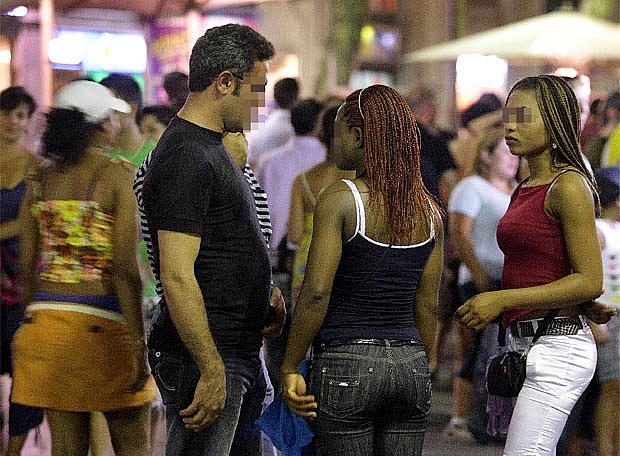 |
| Prostitution in Barcelona, Spain |
Prostitution itself is legal in Spain, but pimping is not. Owning an establishment where prostitution takes place is legal if the owner neither derives financial gain from prostitution nor hires any person for the purposes of selling sex because prostitution is not considered a job, and has no legal recognition. Municipalities vary in their approach to regulating prostitution, both indoor and outdoor.
Switzerland - Prostitution is legal
Prostitution in Switzerland is legal and regulated; it has been legal since 1942.Licensed brothels, typically with a reception and leading to several studio apartments, are available.
Street prostitution is illegal, except in specially designated areas in the major cities. Many prostitutes operate using newspaper advertisements, mobile phones and secondary rented apartments. It is legal to advertise for "massages" in Swiss tabloid newspapers. Swiss prostitutes pay VAT (value added tax) on their services and some accept credit cards. The majority of prostitutes are foreigners from Latin America, Eastern Europe or the Far East. In recent years the number of prostitutes has increased. The prostitution business often becomes violent; it can involve attacks, turf wars, gunfights and arson attacks on rivals' prostitution establishments.
Prostitution is legal over sixteen years of age. Furthermore, the local authorities in Zurich consider installing carport-like constructions called Verrichtungsboxen or 'sex boxes' to protect street prostitutes.
Turkey - Prostitution is legal
In Turkey, prostitution is legal and regulated. Prostitutes must register and acquire an ID card stating the dates of their health checks. Also it is mandatory for registered prostitutes to have regular health checks for sexually transmitted diseases. The police are allowed to check the authenticity of registered prostitutes to determine whether they have been examined properly and to ensure they see the health authorities if they don't. Men cannot register under this regulation. Most sex workers, however, are unregistered, as local governments have made it policy not to issue new registrations. As a result most sex workers in Turkey are not registered sex workers, working in violation of the law.
Ukraine - Prostitution is illega
Prostitution is illegal in Ukraine, but widespread and largely ignored by the government. Sex tourism rose as the country attracted greater numbers of foreign tourists. Laws criminalizing organized prostitution and penalties for human trafficking have had little effect because many convicted traffickers often do not end up serving prison time.
United Kingdom - Prostitution itself is legal
In the United Kingdom, prostitution itself is legal, but a number of related activities, including soliciting in a public place, kerb crawling, keeping a brothel, pimping and pandering, are outlawed.
The Policing and Crime Act 2009 makes it illegal to pay for sex with a prostitute who has been "subjected to force" and this is a strict liability offence (clients can be prosecuted even if they didn’t know the prostitute was forced).
Read More: Where Is Prostitution Legal In The UK?
| While sex work is an ancient trade, it's still a hot-button issue not only on International Day To End Violence Against Sex Workers observed each year on December 17. Organizations like the European Sex Workers' Rights Alliance and the Global Network of Sex Work Projects call for an end to human trafficking while recognizing the demands of voluntary sex workers to destigmatize the practice and to give workers control over their own bodies and means of income. On the other hand, some human rights groups and second-wave feminists call for a complete abolition and criminalization of all paid sexual encounters, at least concerning the buyer's side. |
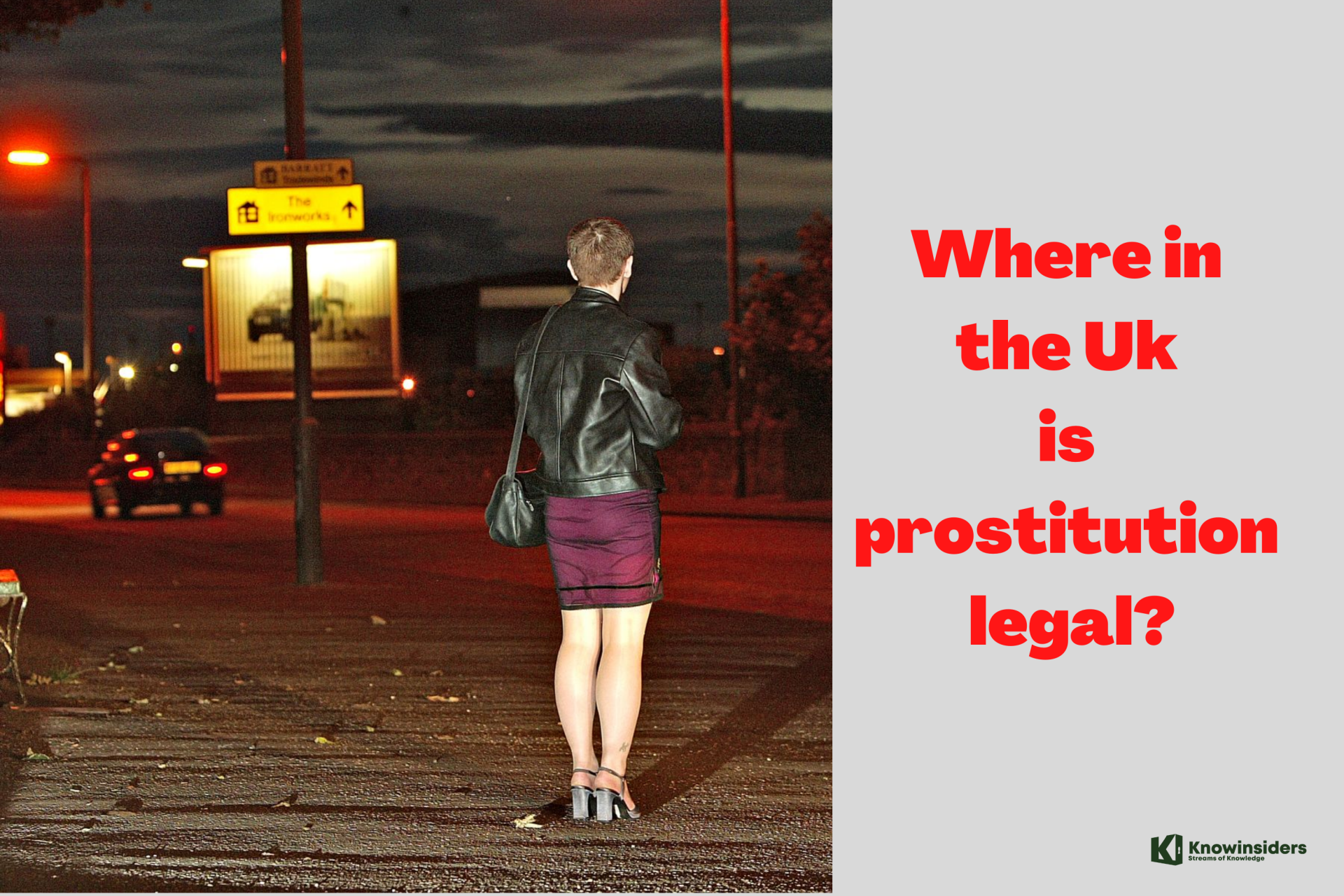 Where Is Prostitution Legal In The UK? Where Is Prostitution Legal In The UK? Have you ever questioned if prostitution is legal in the UK? If yes, read on to know more details about prostitution in the UK! |
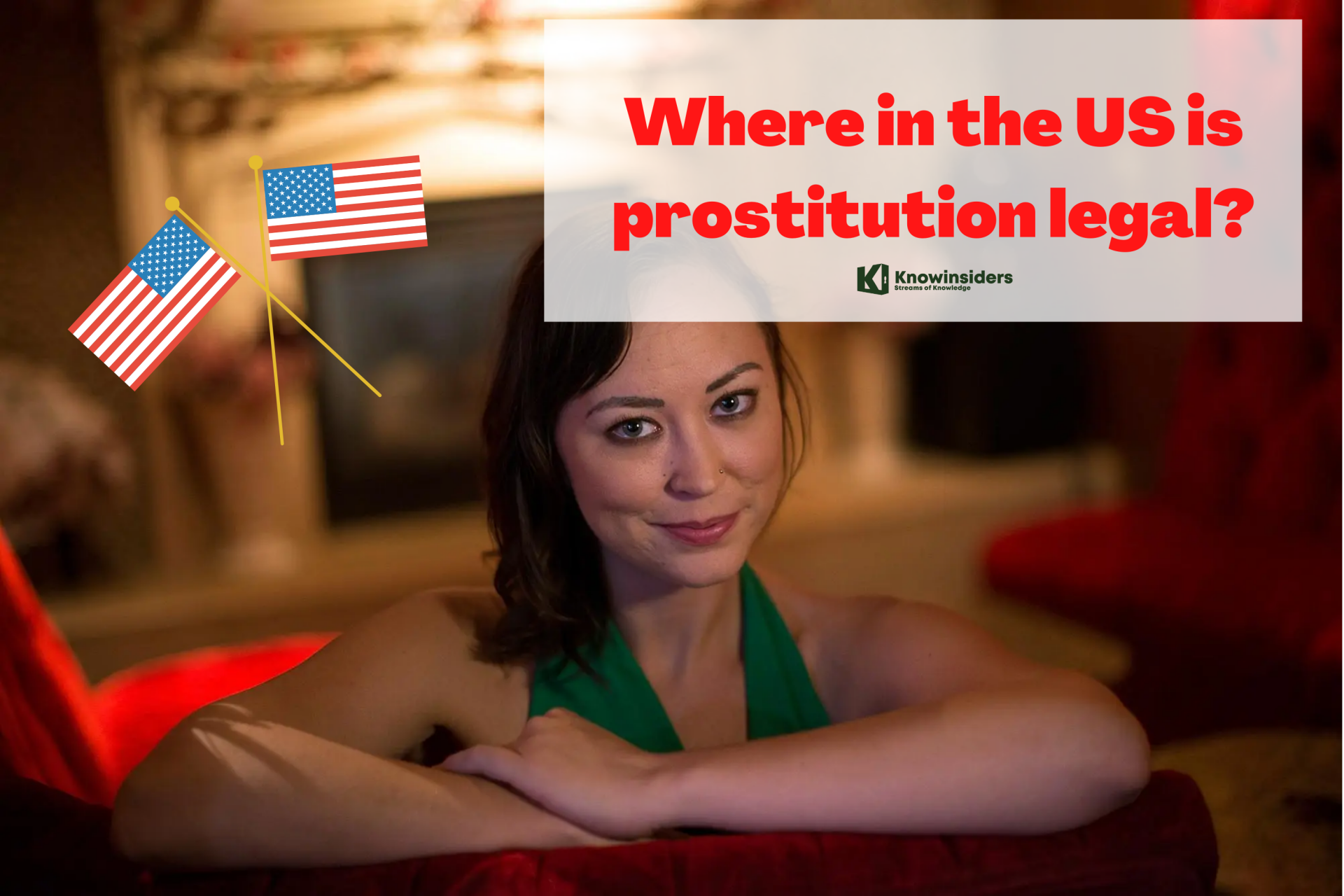 Where Is Prostitution Legal In The US? Where Is Prostitution Legal In The US? Prostitution is illegal in the United States with the exception of 10 Nevada counties. Prostitution is the legal issues that creates an intense debate in ... |
 Where Is Prostitution Legal In The World? Where Is Prostitution Legal In The World? Prostitution exists and will continue to exist despite bans and their legal status, due to reasons like poverty or unforeseen situations. |























